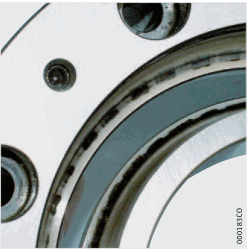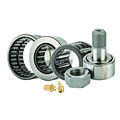Time : June 20, 2023

Figure 1: Thrust angular contact ceramic ball bearings remain reliable under micro motion conditions
With the new type of thrust angular contact ceramic ball shaft ZKLF- After HC, Schaeffler Group can provide reliable solutions for pseudo Bush indentation of spindle bearings driven by lead screws. This means that early indentation failure can be avoided.
Dents
Almost all machine tool manufacturers have faced the premature failure of the lead screw drive bearing. The operating life is generally between a few hours and a few weeks. What is striking is that after being replaced by the service department, the bearing quickly failed again after almost the same short period of time. The cause of this failure is often “dents”.
This ineffective feature is more commonly referred to as the “pseudo Bush indentation” in English speaking countries. In order to better understand the potential failure process, it is necessary to deeply understand the Kinematics of bearings.
In rotating bearings, the phenomenon of “water slip” occurs at the contact area, which is called EHD (fluid elastic contact). This phenomenon is not frightening, it is an objective existence that needs to be overcome. During the operation and contact of the parts, the oil film separates the relative motion between the rolling element and the raceway. Moreover, a wedge-shaped oil or grease film is continuously generated.
If there is not enough relative motion between rotating contact components under the operating conditions at that time, for example, if it is a small angle rotation, the oil film at the contact area is damaged, and dry friction occurs. In this case, it can lead to contact corrosion, which usually occurs when two rotating contacts have relative motion but there is no oil film separating their relative motion. After the protective oxide layer is rubbed off, the exposed iron begins to undergo chemical reactions and point contact corrosion occurs. Due to the vibration problem of all machinery, it will be cleaned before corrosive substances form and enter the grease. The machine will continue to operate in this situation until the rolling element in the raceway is completely corroded, as shown in Figure 2.

Figure 2 Early failure of bearings caused by false Bush indentation in iron/iron contact
In screw drive bearings, the phenomenon of pseudo Bush indentation often occurs when the bearing rotation angle is very small or slightly moving. Because under this movement, it is difficult to form an oil film.
Micro displacement is caused by vibration during machine operation or by shaft positioning. This has a significant impact on mold or chemical users, as their workpieces are usually relatively small.
This damage can manifest as sharp noise or obvious irregular operation of the screw. After the technical personnel arrived at the site, they had to dismantle the screw and replace the damaged bearing in a time-consuming manner. The machine tool that causes this kind of damage usually quickly damages again after repair, and then requires similar repair work. This repeated failure leads to continuous downtime, and requires high-quality service and high warranty costs.
Thrust angular contact ceramic ball bearing
Ceramic rolling elements are always free from iron/iron contact.
Previously, ceramic bearings were not accepted because theoretically their basic rated load was 30% lower than standard bearings of the same design. This is mainly due to the high elastic coefficient of ceramic balls. The contact area of ceramic balls on the raceway is smaller, resulting in greater stress under the same pressure.
However, increasing the size of ceramic balls can achieve a service life not lower than the standard design level. In many cases, the lifespan can be longer.
The DIN working group intends to eliminate the theory of basic dynamic load reduction. In fact, this means that active exploration in application has finally found a method to calculate the basic rated load. The theory of basic static load reduction for ceramic bearings is still valid, but in most cases, it is not related to the arrangement of screw bearings.
Reliable operation and efficient operation
So far, due to the higher price of this ceramic bearing compared to previous bearings, the procurement department has been relatively resistant to this bearing, so it has not been widely used. Although the initial procurement cost was high, due to the absence of later service and maintenance costs, the price difference can be compensated for in the short term. Moreover, as the reliability of machine operation increases, the brand value also increases, which greatly reduces actual costs.
Once the TCO principle is also incorporated into the design, the application of different versions of thrust angular contact ceramic ball shafts in mold production equipment will become an irresistible trend.
Advantages of ceramic ball bearings over steel ball bearings:
♦ Maintains high reliability even under long-term micro motion conditions
♦ Triple grease service life
♦ Higher operating speed
♦ In fact, in most screw drive applications, a 30% lower rated static load is not relevant
♦ The axial stiffness of the raceway system is reduced by only 5%
Customized design examples
ZKLF40100-2Z-HC
♦ ZKLF=Zweireihiges (dual column)
Kugel Lager (ball bearing)
Flanschbar (flange mounted)
♦ 40=inner diameter
♦ 100=outer diameter
♦ 2Z=small sealing gap at both ends Z; Optional
2RS=Two end contact seal (the limit speed is determined by the allowable limit speed of the sealing ring)
♦ HC=mixed ceramic, rolling bearing steel ring, ceramic ball.
More about XBRG Needle roller bearings:
Needle roller bearings have a small cross-section, and they still have a high load bearing capacity. Needle roller bearings are equipped with thin and long rollers, resulting in a compact radial structure. Their inner diameter and load capacity are the same as those of other types of bearings, and their outer diameter is the smallest. They are particularly suitable for supporting structures with limited radial installation dimensions.

Needle Roller Bearings are bearings for rotary motion that use needle-shaped thin rollers as rolling elements. Compared to ball bearings, they have low sectional height and large load capacity. As a machine part, they help save space by making the whole machine compact. They play an important role in a wide range of products such as automobiles, motorcycles, printing machines, industrial robots and construction machinery.
https://www.xzballbearing.com/product-cat/needle-roller-bearings/